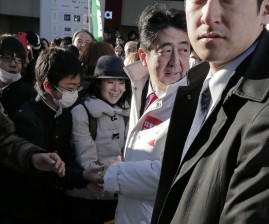Japan election candidates make final pitches
TOKYO — Hundreds of candidates vying for a seat in Japan’s parliament made their final pitches on Saturday in an election expected to see the return of the country’s old guard.
Opinion polls show the Liberal Democratic Party on course for a convincing victory in Sunday’s lower house election, with the Democratic Party of Japan led by Prime Minister Yoshihiko Noda set to be ousted.
Hawkish LDP leader Shinzo Abe is predicted to return to the premiership, a job he held without much distinction in 2006-7, in a move that may herald a hardening of Japan’s foreign policy at a time of heightened tensions with China.
As light rain fell over Tokyo, some of the over 1,500 candidates running in the poll stood before train stations to make final pleas to voters, while their staff held banners with the candidates names and parties printed in bold typeface.
Noda urged voters not to return to the LDP, which governed Japan almost continuously for more than five decades before his party came to power three years ago.
Article continues after this advertisement“The election is about whether we can move forward or turn back the clock,” he said at a train station near central Tokyo, according to the Sankei Shimbun newspaper.
Article continues after this advertisementAbe, in Wako-city, Saitama prefecture, north of the capital, pledged to reform Japan’s education system, and in particular tackle the issue of bullying.
“We will do everything we can, including passing laws to prevent bullying,” Abe was cited as saying by the Sankei.
The conservative ideologue has pledged in previous campaign speeches to “repair the Japan-US alliance and firmly defend our territorial soil and waters”.
Candidates have until 8:00 pm (1300 GMT) to campaign.
In one of the last gauges of the public mood before the vote, polls published Friday showed the LDP and its junior coalition party set to achieve a possible two-thirds majority in the lower house ballot.
That would hand Abe a mandate to try to fulfil his campaign pledge of bolstering Japan’s military and coastal defences, particularly on the Tokyo-controlled Senkaku islands, which Beijing claims as the Diaoyus.
On Thursday Japan scrambled fighter jets after a Chinese plane entered airspace over the Japanese-held chain. Tokyo said it was the first time a Chinese state-owned plane had breached its airspace.
North Korea’s rocket launch earlier this week could also boost the right-wing vote in a country that lives uneasily next door to an unpredictable Pyongyang.
Polls indicate that despite a strong current of anti-nuclear feeling since the March 2011 tsunami sparked reactor meltdowns at Fukushima, an array of smaller parties promising an atomic exit may struggle to gain traction.
On the economic front Abe has been vocal in calls to tackle deflation that has beset the economy, vowing to impose a three percent inflation target on the Bank of Japan and forcing it to buy bonds — effectively deficit financing.
He has since rowed back after criticism he was endangering the independence of the central bank. But his comments helped pull down the high yen, delighting exporters hit hard by the surging currency.
Noda’s DPJ struggled in government to live up to the promise of its barnstorming 2009 election win that cracked the LDP’s half-century virtual stranglehold on power.
